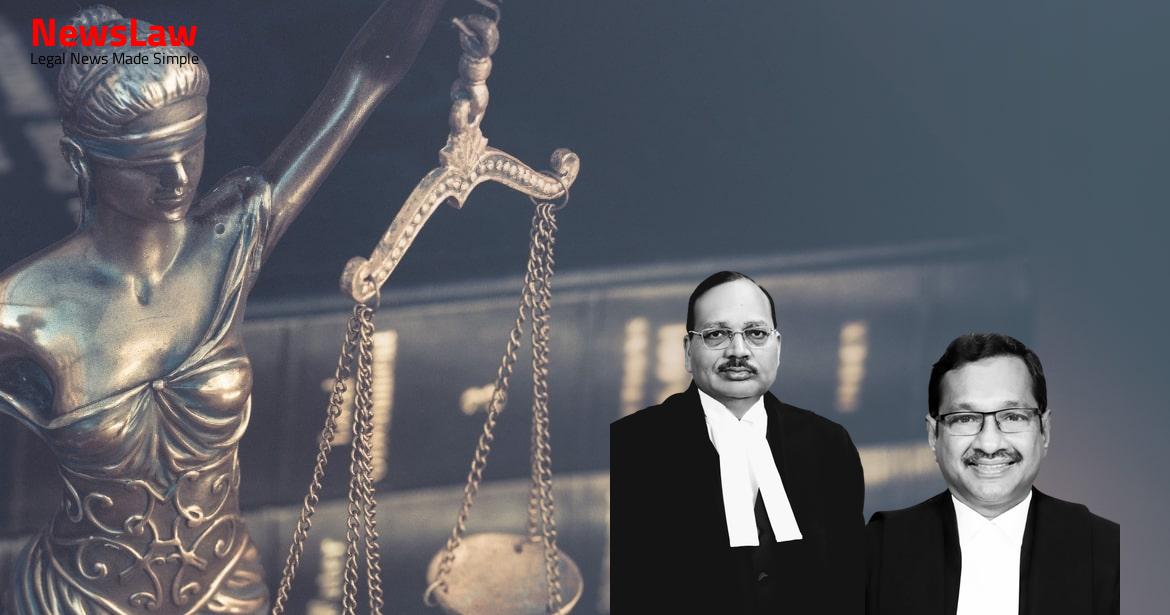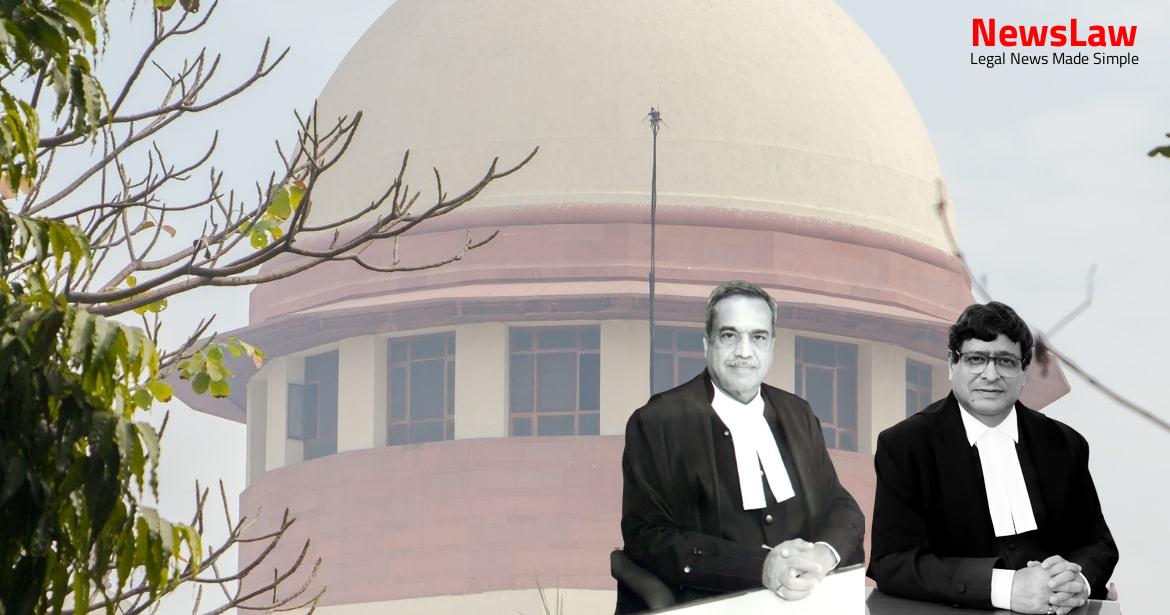Delve into the intricate legal analysis conducted by the courts regarding State Enactments versus RBI Regulations for Non-Banking Financial Companies (NBFCs). The case delves deep into the jurisdictional conflicts and regulatory frameworks governing the financial sector. Stay tuned to unravel the intriguing insights provided by the court’s thorough legal analysis in this crucial matter.
Facts
- NBFCs approached the Government of Kerala for exemption from the provisions of the Kerala Act 14 of 2011, but were unsuccessful.
- NBFCs then filed writ petitions in the High Court of Kerala and special civil applications in the High Court of Gujarat, challenging the application of the respective state Acts to NBFCs registered under the RBI Act.
- Concerns arose due to the rapid growth of NBFCs, leading states like Kerala and Gujarat to enact specific Acts to regulate their operations.
- The Kerala Act 14 of 2011 and the Gujarat Act 14 of 2011 aimed to impose regulations on NBFCs by requiring licenses and setting penalties for non-compliance.
- The appeals filed by NBFCs in Kerala sought a declaration that NBFCs registered under the RBI Act should not be governed by the Kerala Act.
- A petition by the Chief Executive Officer of Bajaj Finance Limited requested the transfer of a quash petition under Section 482 of CrPC related to an FIR registered under the Kerala Act from the High Court of Kerala.
- In Gujarat, the Bombay Money Lenders Act, 1946 was used by the Registrar of Prevention of Money Lenders against NBFCs in 2009, prompting the need for the Gujarat Act 14 of 2011.
- The Kerala Act, 1958 and the Gujarat Act 14 of 2011 aimed to regulate money lending and interest rates, as non-banking financial companies were not initially regulated by the RBI or the Parliament.
- A learned Judge of the High Court of Kerala dismissed the batch of writ petitions which was confirmed by the Division Bench of the High Court.
- Consequential direction by Gujarat High Court restraining State Government from applying Gujarat Act against NBFCs registered under RBI Act.
- State of Gujarat filed Civil Appeals against the above decision.
- Learned Judge of Gujarat High Court quashed notices issued to NBFCs under Bombay Money Lenders Act.
- Division Bench of the High Court allowed special civil applications holding Gujarat Act 14 of 2011 as ultra vires the Constitution in terms of controlling NBFCs under the RBI Act.
Also Read: Undisclosed Conviction for Dharna Under Police Act Leads to Overturned Election
Arguments
- Statutory enactment lacking provision on rate of interest on loans cannot be considered a complete code
- NBFCs crucial for financial health, reliant on income from interest on loans
- Argument that Gujarat Act exempts NBFCs from registration under RBI Act not accepted
- Reserve Bank of India does not control interest rates charged by NBFCs
- State enactment controlling interest rates not considered repugnant due to RBI’s limited control under Section 45-JA
Also Read: Critical Analysis of Legal Principles in a High-Profile Criminal Case
Analysis
- The State law must give way if both the Parliamentary law and State law are referable to List-III.
- Article 246(1) comes into play if the Parliamentary law is traceable to List-I and the State law is traceable to an Entry in List-II.
- Repugnancy under Article 254 arises only if both the Parliamentary law and State law are referable to List-III.
- In case of a complete, exhaustive, or exclusive code, a State law may be inoperative due to the Parliamentary law.
- The RBI Act takes a holistic approach to banking, money lending, and the currency and credit system of the country, unlike State enactments focusing on borrower protection.
- The Kerala Act’s legacy traces back to the Madras Pawn Brokers Act, 1943, and is based on the protection of borrowers from usurious loans.
- Section 45-L empowers RBI to call for information and give directions to financial institutions.
- RBI can require financial institutions to furnish statements, information, or particulars relating to their business.
- Directions can be given to financial institutions regarding the conduct of their business.
- RBI can also give directions to non-banking institutions regarding receipt of deposits, interest rates, and other related matters.
- Non-compliance with RBI’s directions can lead to prohibition of accepting deposits by the institution.
- Every NBFC should create a reserve fund and transfer a specified percentage of their net profit to this fund annually.
- RBI has the authority to remove directors or supersede the Board of Directors of an NBFC if it is in the public interest or to protect depositors.
- RBI can issue directions to NBFC auditors regarding financial statements and other matters, with potential action against non-compliance.
- Schemes for amalgamation or reconstruction of NBFCs can be framed by RBI if it is in the public interest.
- RBI can also file for the winding up of an NBFC under certain circumstances.
- There is a presumption in favour of the validity of statutes.
- The onus of showing that a statute is repugnant to another lies on the party attacking its validity.
- Efforts should be made to reconcile competing statutes and construe them to avoid repugnancy.
- The doctrine of pith and substance must be applied to determine the reference of statutes to the Concurrent List.
- Three important tests of inconsistency or repugnancy are reiterated: direct conflict, exhaustive Code intention, and occupation of the same field.
- The Constitution Bench decision in Deep Chand supports the case of NBFCs, stating Chapter III-B as a complete code.
- The Securitisation Act is considered dominant legislation based on the non-obstante clause in Article 246(1).
- Propositions on repugnancy under Article 254 are outlined, stating conditions for its application.
- Case law examples such as Innoventive Industries Limited vs. ICICI Bank and Anr. are discussed to illustrate conflicts between laws.
- The doctrine of eclipse is invoked in cases such as Kailash Sonkar vs. Smt. Maya Devi for caste considerations.
- Transfer Petition (Crl.) No.359 of 2015 allowed and the FIR against the officer of the NBFC quashed.
- Impleadment application by Mr. Davidson Dharmaraj in Civil Appeal No.5238 of 2012 highlighted criminal complaint against M/s. Muthoot Finance PVT. LTD.
- Principles of law laid down in the judgement equally applicable to Tamil Nadu Pawn Brokers Act and Tamil Nadu Money Lenders Act.
- The Kerala Act and Gujarat Act deemed to have no application to NBFCs registered under RBI Act and regulated by RBI.
- All appeals filed by NBFCs against the Kerala High Court judgment allowed.
Also Read: Legal Analysis on Specific Performance Obligations in Land Sale Agreement
Decision
- Appeals filed by the State of Gujarat against the judgment of the Gujarat High Court are dismissed.
- No order as to costs for the State enactments.
- Application for impleadment, namely I.A. No.2 of 2015, is dismissed.
Case Title: NEDUMPILLI FINANCE COMPANY LIMITED Vs. STATE OF KERALA . (2022 INSC 545)
Case Number: C.A. No.-005233-005233 / 2012



